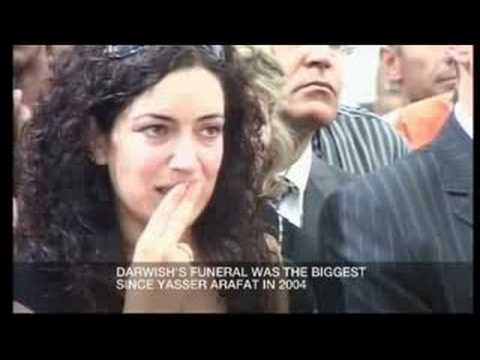By Sayid Marcos Tenório | –
( Middle East Monitor ) – Mahmoud Darwish is the most internationally-renowned Palestinian poet and writer, although still little-known in Brazil. He is the author of 30 poetry books and eight prose books, translated into more than 40 languages, and winner of the Cultural Freedom Prize, the Lannan Foundation (US), the Lenin Peace Prize (former the Soviet Union) and was appointed a Knight of the Order of Arts and Letters by France. His works in the 1960s and 1970s reflect his opposition to the occupation of his homeland.
“He was the prince of words, and his name was Mahmoud Darwish,” said Lebanese novelist Elias Khoury. Darwish was a poet of enormous sensitivity with a fighting spirit who used poetic phrases such as: “How can a handwrite if it’s not creative when making coffee.”
In addition to writing the resounding Declaration of Independence for Palestine, proclaimed by the leader of the Palestine Liberation Organisation (PLO) Yasser Arafat, on 15 November 1988, in Algiers, Algeria, he has always taken a firm stance in defending the liberation of Palestine. Therefore, he withdrew from the organisation after the Oslo Accords, signed in 1993, which he called “a give-and-take” between the PLO and Israel. Darwish considered the Oslo Accords to be “the greatest recklessness ever committed by a leader [Arafat] to their people.”
Darwish was born in the Palestinian village of Al-Birwa, Galilee, in 1941, to a Sunni family of small farmers. He was the second of eight siblings. The village where he was born was occupied and razed to the ground by the Zionist occupation forces in the Nakba process in 1948. This led the Darwishes to take refuge in Lebanon for a year, where they began to live as “foreigners”. Upon returning, the poet found that his Al-Birwa home had been replaced by a Jewish colony with the new name of “Ahihud”.
He was arrested several times between 1961 and 1967 for reciting poetry and travelling between villages in occupied Palestine “without authorisation” by the forces of the “Jewish state”. His poem “Identity Card”, which was turned into a protest song, resulted in his house arrest order. After these persecutions and arrests, Darwish was forced into exile, which took him to places like Cairo, Tunis, Moscow, Beirut, and Paris, returning only in 1996, when he was authorised by the occupation to attend a funeral.
The expulsion of Palestinians is a recurrent theme in Darwish’s work. He portrays the trajectory of anguish, pain, and suffering due to deaths and expulsions since the creation of the “State of Israel” and calls Palestine the “lost paradise” and the “land of divine messages revealed to humanity”, as described in Palestine’s Declaration of Independence. His work reveals the unbroken and unaltered organic relationship between the Palestinian people, their land, and their history . . .
[His Memory for Forgetfulness] recounts personal memories of 6 August 1982, coincidently, the anniversary of the US terrorist attack on Hiroshima. This was one of 88 days of the siege in which Zionist state jets dropped bombs on Beirut, killing people – a reality Darwish experienced closely during his exile in Lebanon. The book reminisces on the meaning of exile – and not the diaspora – and on the role of a writer in times of crisis and war. His work expresses his love for Palestine and its people, who “have existed and resisted” for over 73 years . . .
Darwish’s work is permeated with the testimony of life and struggle, marked by the suffering in exile and the attempt to uproot the Palestinian people from their land. The author’s poems and stories bring an intimate feeling that is the same as that of the Palestinian people, in which resistance, by all means, is the only way to survive and the only way to free Palestine from the Zionist colonial occupation.
Mahmoud Darwish, If I were Another, trans. Fady Joudah.
Darwish has never renounced his status as a resistant Palestinian national poet, making it clear in every line of his work that the suffering of the Palestinians is not just of those who live under occupation or in exile. Such torment belongs to everyone, since the crimes perpetrated daily by the Jewish state are crimes against humanity.
The question present in Darwish’s work is one that everyone asks: Why would Palestinians have to recognise the State of Israel in the territory of historical Palestine without defined borders and in permanent expansion, and accept small islands of land as if Palestine were a ministate? The author himself answers this in his poem “Identity Card”: “Is the government going to take away the rocks from me, as they told me?” Then he writes at the top of the first page: “I hate no one, no one I steal. But if I am hungry, I will devour the usurper’s flesh. Beware! Beware of my hunger, Beware of my anger!”
Sayid Marcos Tenório is a historian and specialist in international relations. He is vice president of the Brazil-Palestine Institute (Ibraspal) and author of the book Palestina: do mito da terra prometida à terra da resistência (Palestine: the myth of the promised land to the land of resistance) (Anita Garibaldi/Ibraspal, 2019).
The views expressed in this article belong to the author and do not necessarily reflect the editorial policy of Middle East Monitor or informed Comment.
This work by Middle East Monitor is licensed under a Creative Commons Attribution-NonCommercial-ShareAlike 4.0 International License.
—–
Bonus Video:
Al Jazeera English: “Mahmoud Darwish remembered – 14 Aug 08 – Part 1”



 © 2024 All Rights Reserved
© 2024 All Rights Reserved